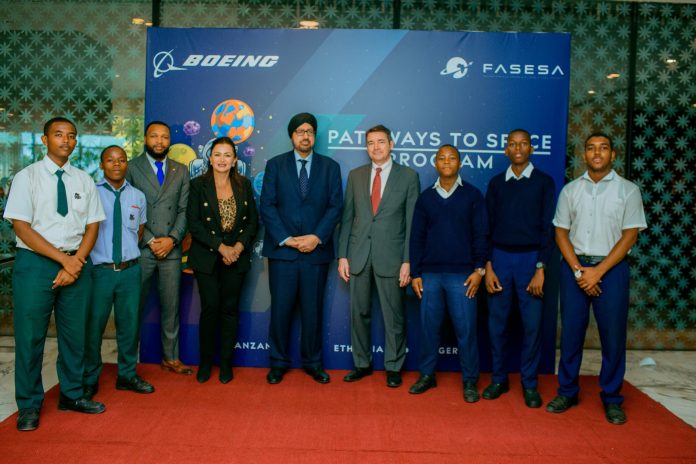Despite it being under fire from regulators and airlines since a door plug blew out of a 737 MAX 9, and pressure from the U.S. Federal Aviation Administration barring it from expanding production of its best-selling 737 MAX planes, Boeing and the Future African Space Explorer’s STEM Academy (FASESA) have introduced “Pathways to Space”, an educational initiative targeting high school students aged 15-20 in Ethiopia, Nigeria, and Tanzania.
“Pathways to Space” is expected to reach 300 students – 100 in each of the three countries – over five months, commencing on February 6, 2024. “Pathways to Space” will promote diversity, equity, and inclusion, with more than 50% of the participants being girls.
According to Kuljit Ghata-Aura, Boeing president in the Middle East, Türkiye, Africa and Central Asia: “Space exploration symbolizes global cooperation, and Boeing was privileged to help put the first man on the Moon. Through “Pathways to Space” program, we’re excited to share our 60-year space expertise with African youth and inspire the next generation to reach for the stars”.
“We are thrilled to join forces with Boeing to launch “Pathways to Space”, a transformative educational program that will open new horizons for high school students in Africa,” said Sean Jacobs, founder and executive director at FASESA. “By fostering STEM literacy and providing hands-on experience, we aim to ignite a passion for space exploration and empower students to pursue rewarding careers in aerospace.”
The “Pathways to Space” initiative is a collaborative effort with local educational and government institutions in Ethiopia, Nigeria, and Tanzania. The program is aimed at state schools identified by the local Ministries of Education and Ministries of Science and Technology and will cultivate STEM literacy, kindle interest in the space industry, and equip the students with essential skills for future success in aerospace careers.
The immersive, project-based learning experience that melds theoretical knowledge with practical applications and focuses on the development of key skills, such as critical thinking, problem-solving, collaboration, and creativity, the program aims to empower the next generation of aerospace professionals in Africa. The students will receive certificates to add to their portfolios after successful completion of the course.
Through this partnership, FASESA and Boeing aim to bridge the gap between academia and industry, bringing together the expertise of both organizations to create a comprehensive curriculum tailored to the needs of African students.
The “Pathways to Space” program builds on ambitious space exploration aspirations of the African nations.
- Ethiopia: Ethiopia is gearing up to launch its second satellite and has plans for 10 more by 2035.
- Nigeria: Since the establishment of the National Space Research and Development Agency in 1999, Nigeria has achieved milestones, including the deployment of its first satellite NigeriaSat-1 in 2003 and collaborations with international partners, such as China, for more satellite launches and space capabilities development.
- Tanzania: In May 2023, Tanzania’s President Samia Suluhu Hassan disclosed the country’s intention to launch its space program. Since then, Tanzania has been inching closer to achieving this goal, with the orbit slot acquisition being the latest milestone and with plans to launch the first satellite imminently.
FASESA and Boeing aim to expand the reach of the “Pathways to Space” program to other countries in Africa in the years to come. Starting next year, the program will also feature both in-person and online participation and online application at fasesa.com to create opportunities for more students in various geographical locations across the African continent.
Since 2008, Boeing has partnered with over 40 non-profit organizations in Africa and invested $22 million to support systemic improvements in education and economic empowerment.



